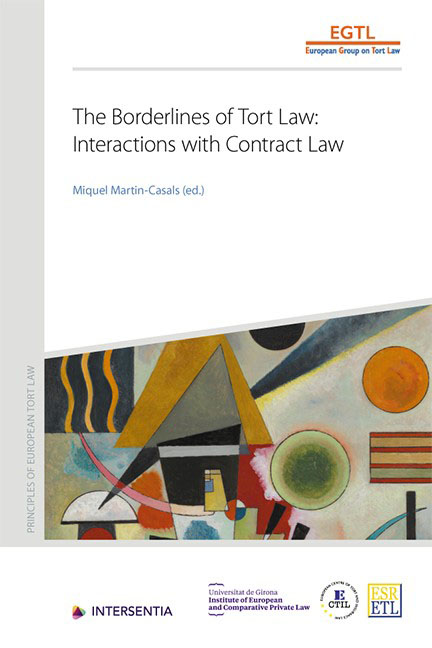Book contents
Israel
Published online by Cambridge University Press: 15 November 2019
Summary
QUESTIONS
TRACING THE BORDERLINES
A. DISTINCTION BETWEEN TORT AND CONTRACT
The distinction between tort and contract is in principle based on the facts that have to be established in order to constitute a cause of action. Contract law (statutory and case law) requires the claimant (C) to establish that an obligation under a valid contract was breached, that the contract has defects, that a pre-contractual obligation was breached, etc. Tort law (statutory and case law) requires C to establish that a specified tort was committed or that a duty which is classified as part of tort law has been breached.
B. EXISTENCE OF A ‘GREY ZONE‘?
A ‘grey zone’ between contract and tort exists where the facts of a case constitute both a cause of action in contract and a cause of action in tort. This, for example, may happen in cases of lack of good faith in pre-contractual negotiations. Absence of good faith may constitute a cause of action under contract law for breach of the pre-contractual duty of ‘bona fide’ negotiations, and also a cause of action in tort law, usually for negligent misrepresentation. Yet, remedies may differ under these different causes of action.
C. COMMON OR DIFFERENT RULES REGULATING TORT AND CONTRACT
At present each field of law is governed by the statutory provisions that are classified as being either ‘tort’ law or ‘contract’ law. The same applies to case law, which interprets and supplements those provisions. Therefore, in principle, there are no rules common to tort and contract but rather different rules, for example regarding legal causation, remoteness of damage, joint liability and, most importantly, remedies. The remedy of specific performance (enforcement), for instance, is traditionally considered primary in contract 4 law but only secondary in tort law.
Notably, there is both a legislative and judicial tendency to unify contractual rules and rules in tort. The proposed Civil Code of 2011, for example, to a considerable extent unifies remedies under tort and under contract. Another step already taken toward unification is the application of the statutory tort defence of ‘contributory (comparative) negligence’ by the courts to contract law, although absent in statutory law.
- Type
- Chapter
- Information
- The Borderlines of Tort LawInteractions with Contract Law, pp. 253 - 280Publisher: IntersentiaPrint publication year: 2019



